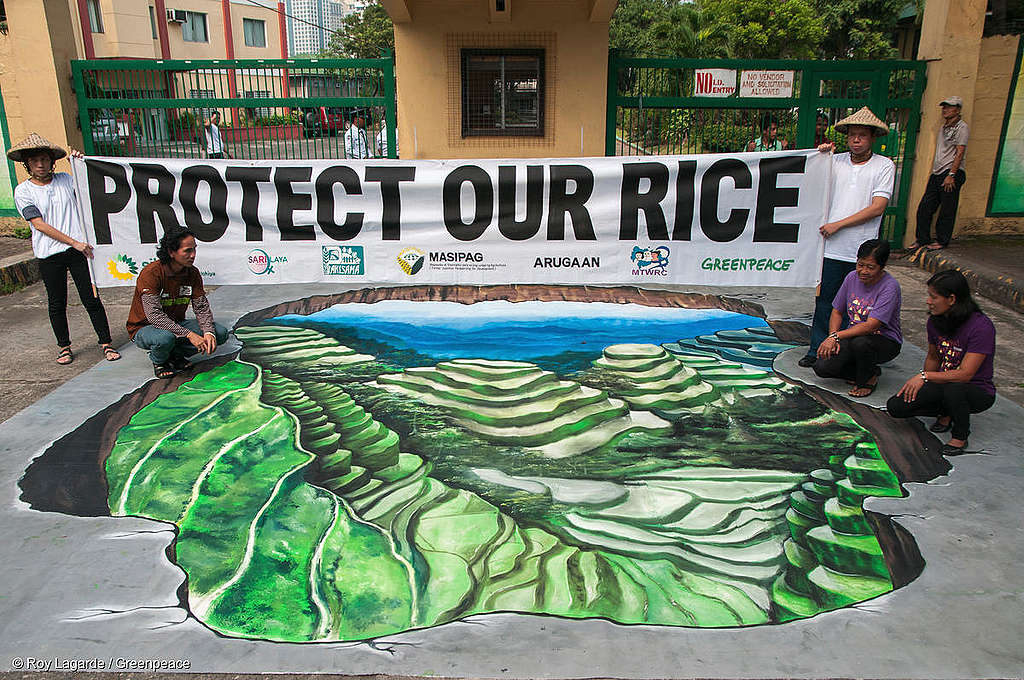QUEZON CITY, Philippines —The Philippine Court of Appeals (CA) stood its ground and upheld its decision to protect the people’s right to a healthy environment,[1] revoking the biosafety permit and ordering PhilRice[2] to cease and desist the on-going commercial propagation and activities on genetically modified Golden rice and until there is proof of safety and all legal requirements are complied. The court also upheld its cease and desist order against the commercial propagation and activities related to Bt eggplant, another genetically modified crop currently farmed in the Philippines.

In response to this, Greenpeace Southeast Asia campaigner Wilhelmina Pelegrina said:
“The ruling further solidifies the win for farmers and Filipinos, who initiated the writ of kalikasan legal process,[3] and who have long opposed genetically-modified (GM) crops, so as to protect our country’s food, agriculture, and environment. In banning the propagation and conduct of activities with Golden Rice and Bt Eggplant, the CA continues to uphold the constitutional rights of Filipinos, as well as the government’s duty to serve the interests of Filipinos rather than that of agrochemical companies.”
“The proponents of these dubious GM crops should respect the Court’s decision instead of spreading lies in the media against Filipino farmers, scientists, and Greenpeace. They should also respect the right of Filipinos to farm and eat the food they want, instead of forcing Western products in a neocolonial fashion. Filipino farmers and researchers are already addressing nutrition deficiencies through holistic and sustainable solutions to our food systems that entail a more diverse diet, equitable access to food, and ecological agriculture.”
Since the release of the original CA decision in April, Greenpeace and Filipino petitioners have been the subject of a plethora of negative propaganda in international news outlets, which prompted farmer-scientist group Magsasaka at Siyentipiko para sa Pag-unlad ng Agrikultura (MASIPAG) to release an open letter last June.[4]
“That the country is already heavily dependent on imported GM corn and soya meal for animal feeds already shows the failure of local GM production in the first place. Greenpeace has constantly raised a red flag on GM crops being approved in the Philippines despite the lack of robust data on safety assessments submitted by proponents.[5] We believe Filipinos should have the autonomy to choose the technology or solution that best fits their needs. To allow further infiltration of other GM crops—especially of rice, the nation’s staple food—is extremely counterintuitive and would be hugely detrimental to our economy and our farmers.”
“Filipinos’ food and agriculture systems are already in a volatile state with our import dependence alongside the worsening impacts of climate change. Rather than aiding foreign corporations seeking to encroach on Filipinos’ agricultural independence and food sovereignty, the Department of Agriculture should instead promote sustainable agricultural solutions that would provide nutrition and ample resources to farming communities, as well as ensure self-sufficiency in the face of the climate crisis.”
Notes to editors:
[1] [3] Court of Appeals’ amended decision on GM Golden Rice and Bt Talong granting the writ of kalikasan, a legal remedy that provides a mechanism for protecting the right to a healthy environment, as enshrined in the Philippine Constitution.
[2] PhilRice or Philippine Rice Research Institute is a government agency dedicated to rice research, development, and extension.
[5] Greenpeace submits formal appeal to Dept. of Agriculture to revoke “golden rice” approval (2019)
For requests for interviews and other information, please contact:
Karl Orit, Communications Campaigner
Greenpeace Philippines
[email protected] | +63 919 4571064

![[Blog] What community outreach taught me about true Climate Justice](https://www.greenpeace.org/static/planet4-philippines-stateless/2025/03/943e1bf1-1.jpg)

